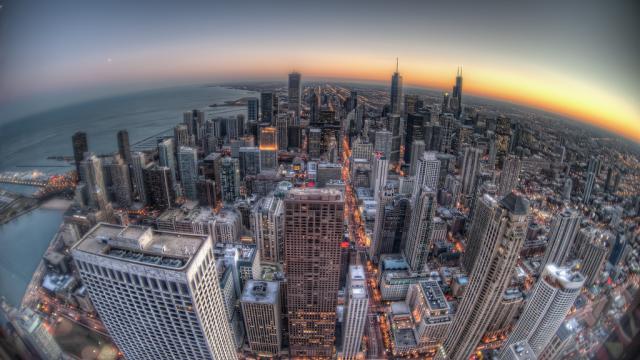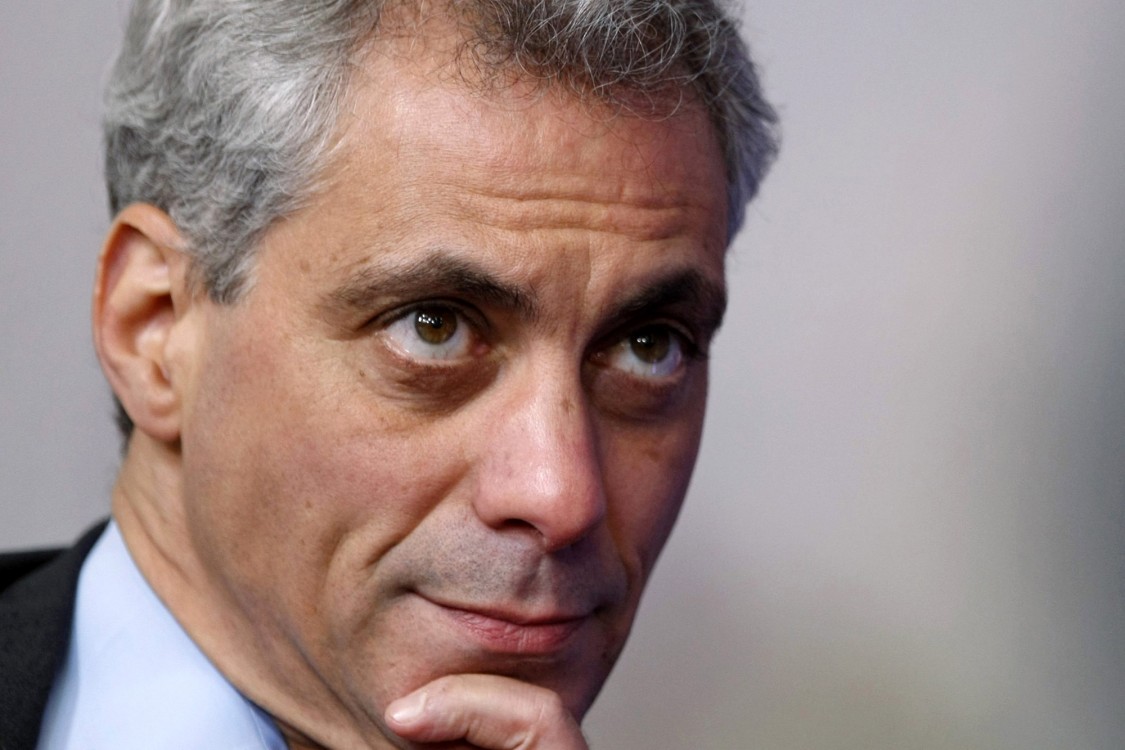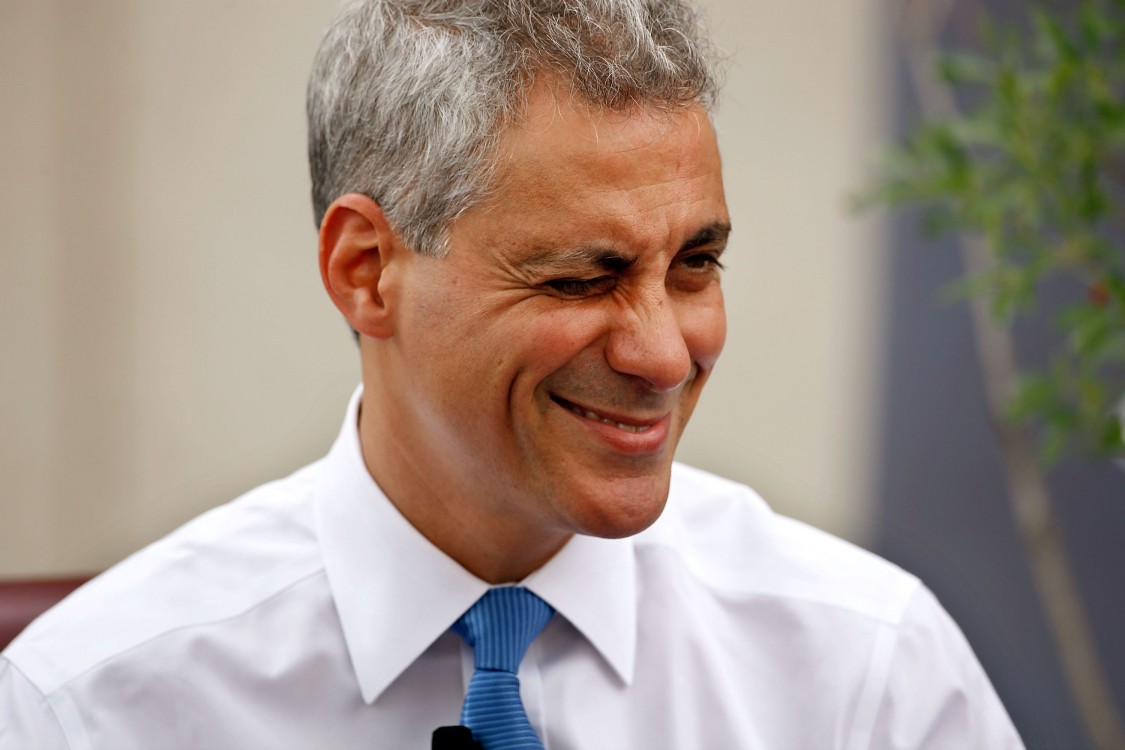
“No one I know could afford to live overlooking Millennium Park. So it’s like there are two Chicagos: one for Rahm and his friends and one for the rest of us. The new Chicago glitters from the skyscrapers, but it’s still dirty and broken down for the rest of us.” -Anonymous respondent to a New York Times Reader Response Survey
Chicago politics have always been rough and tumble, from the earliest days of the Republican and Democratic machines in the late 19th century to the Daley dynasty that has ruled the city on and off since the mid-1950s. The city’s mayors usually have outsized influence not only on municipal affairs but on state politics in Illinois as well.
Current Mayor and former Obama chief of staff Rahm Emanuel is no exception to the rule. This made it something of a surprise when on Feb. 24 he failed to receive the 50% of the vote needed to win a second term, forcing a runoff election with Jesus “Chuy” Garcia, a progressive Cook County Commissioner with no real national profile.
The notoriously thin-skinned Emanuel, also previously an investment banker, former congressman and Bill Clinton’s chief fundraiser during his 1992 campaign, has presided over the city's neo-liberal policies that have closed schools and mental health facilities while giving generous subsidies to well-connected real estate developers.
Toss in an epidemic of gun violence and incredibly abusive police practices targeting mostly black and brown citizens and you begin to understand how Emanuel has earned the nickname Mayor 1%, and with it, the ire of many voters.
In some ways, Rahm Emanuel’s cascade of calamities points to larger problems within a Democratic party that is being tugged by neo-liberals of the Clinton/Obama school, on the one hand, and progressive forces who've become more vocal in their opposition to the long rightward drift of the party, on the other.
A defeat for the Mayor this April could mean the beginning of a new era not only for Chicago, but for urban areas throughout the U.S., following closely on the heels of progressive mayoral victories in New York and Pittsburgh. It raises the hope that Democratic politicians might be forced to finally listen to their base over their donors or suffer the consequences of a progressive wave.
Just ask the successful establishment Republicans who at first dismissed the Tea Party movement – that is, if you can find any.
Rahm the Neo-Liberal “Reformer”
It not like Chicago’s problems began under Emanuel. The city has been undergoing a decades long transition into what is now a deeply divided place. Over the years, the middle class has migrated to the suburbs leaving behind a small elite of wealthy and upper middle class who dominate a few neighborhoods in the North and Northwest of the city, and the urban poor “who are stuck with failing schools, high crime, and a shrinking network of bus lines.”
Still, it’s difficult for Emanuel’s defenders to argue that his administration hasn’t exacerbated both the problems and the divide splitting the city. He also hasn’t been able to avoid the stink of corruption that has tainted almost every mayoral administration in the city’s history.
Take the example of Deborah Quazzo. She was appointed by the mayor to the Board of Education in June of 2013 (Chicago school boards aren't elected as they are in many U.S. cities). She also happens to be one of the founders of GSV Advisors, a venture capital firm with significant investments in the privatization of school services.
GVS saw its investments triple in value in the year after she took the position. This occurred at the same time that dozens of schools, mostly in poor and working class neighborhoods, were closed and the teacher’s union essentially broken, with many teachers replaced by the software-based solutions offered by some of the same companies Quazzo’s firm is invested in.
In response to the Chicago Sun-Times, which had investigated her obvious conflicts of interest, Quazzo sent an angry letter to her supporters including contact information and photos of top executives at the paper, and asked them to complain about the unfavorable stories. She also stated that all of the profits from her investments would be given to educational charities during her time on the board and for one year after her tenure ends. This neglected the fact that venture capital firms make most of their money from the sale of their investments at a much later date – often we're talking years.
Then there’s the mayor himself, whose campaign advisers have tried to show him as someone chastened by the upcoming runoff. During his term in office, the Mayor eliminated half the community-based mental health clinics in the city, ignoring the pleas of citizens and activists. This was done with the convenient excuse of reining in spending, but critics have noted that Emanuel's administration, while claiming poverty, has handed out more than $1.7 billion in corporate subsidies during his tenure.
At a public meeting on March 4, Debbie Delgado, a member of the the activist group Mental Health Movement, interrupted the mayor to explain how the closing of one of the city’s neighborhood mental health clinics had effected her family.
“She told of losing her son to gun violence. She told how her other son was holding him as he died. She told about how the city’s Northwest Mental Health Clinic in Logan Square saved their lives, helped her and her son deal with the PTSD and depression. Then she asked why he took that clinic away from her,” Matt Ginsberg-Jaeckle, another member of the group who was with Delgado at the meeting, wrote on his Facebook page shortly after.
This led to Emanuel asking to meet with the activists behind closed doors. Assuming that the mayor would give them a fair hearing, they accepted. Unfortunately, according to Ginsberg-Jaekle, Emanuel showed them the type of treatment that earned him another nickname earlier in his career: “Rahmbo.”
While being questioned, he began to get angry. “Emanuel ‘got in my face,'” Ginsberg-Jaeckle recalled. According to a piece in Salon, the Mayor was screaming, “You’re gonna respect me! You’re gonna respect me! You’re gonna respect me!”
This was, of course, precisely the kind of story the Emanuel campaign wanted to avoid as Garcia begins to close the gap with the mayor in polling for the April 7 runoff, but it sometimes appears as if Emanuel can’t help himself.
Besides all the problems that he’s brought on himself through his policy choices and divisive leadership style, Mayor Emanuel is now watching helplessly as the Chicago police force gets engulfed in a series of scandals that are eroding whatever trust residents of the city had in them to begin with.
One of the more shocking news stories in recent months was the investigative piece by Guardian reporter Spencer Ackerman, detailing the existence of a CIA-style black-site in Homen Square on Chicago’s Westside. Suspects detained at the site were denied their Miranda rights and access to lawyers, and some people held there reported the use of harsh interrogation techniques. At least one man, 44-year-old John Hubbard, was never charged with a crime and died at the site.
The black-site revelations were only the latest in a number of stories chronicling abuses in Chicago going back decades – including that of Detective John Burge and his “midnight crew,” who tortured more than 100 black men who were in their custody. To add insult to injury, the former detective was recently released from prison after serving less than four years of his sentence. While Burge’s crimes can’t be blamed on Emanuel, the detective's early release could certainly hurt the mayor politically.
Meanwhile, the assumption that an endorsement from President Obama would put the mayor over the top with Chicago's African-American voters, who make up one-third of the city’s population, has already back-fired. Its hard not to reach the conclusion that the community’s day to day interactions with Chicago police are one of the reasons why.
To say that black and Latino residents of Chicago are routinely targeted by the CPD is no exaggeration. For residents who have been stopped and harassed, the solution offered up by authorities – who demand guns from suspects, to look as if they’re making head-way in the battle against violent crime, in what's become the murder capital of the U.S. – increasingly looks more like abuse of power.
“If they feel like they can take your car, they ask you, 'What could you do for yourself?'" said Albert Smith, one of the people who came forward claiming to have been held in the Homan Square facility. "They really be wanting you to give them a gun... once they feel they got you boxed in, they like, 'Well, what could you do for yourself? You give us a gun, or who could you tell on?’ Mostly they want a gun.”
Yet despite Emanuel’s many problems, the runoff with Garcia is still a David vs. Goliath fight. Mainstream opinion favors the mayor, as an editorial in the Washington Post, written shortly after the election, supposes little doubt that Emanuel’s banker friends will come through with the election money required to keep Chicago’s corporate gravy train running.
Some of the nation's larger progressive groups, like Moveon.org, are lining up behind Garcia, but there is no doubt the challenger will be outspent in the run-off. For his part, Garcia sounded confident in a recent interview:
“We will win in April because of the coalition we’re building, because of the message that people are responding to, and I think that Chicagoans will reject the corporate attempt to hijack the city away from ordinary people and the neighborhoods for another four years. People want a city that’s more equitable, that’s inclusive, and that will be sustainable into the future,” he said.
For many Chicago residents, it’s a vision for the city that can’t come soon enough. If you're a Chicago voter, you can find a schedule for the run-off election here.
3 WAYS TO SHOW YOUR SUPPORT
- Log in to post comments

















